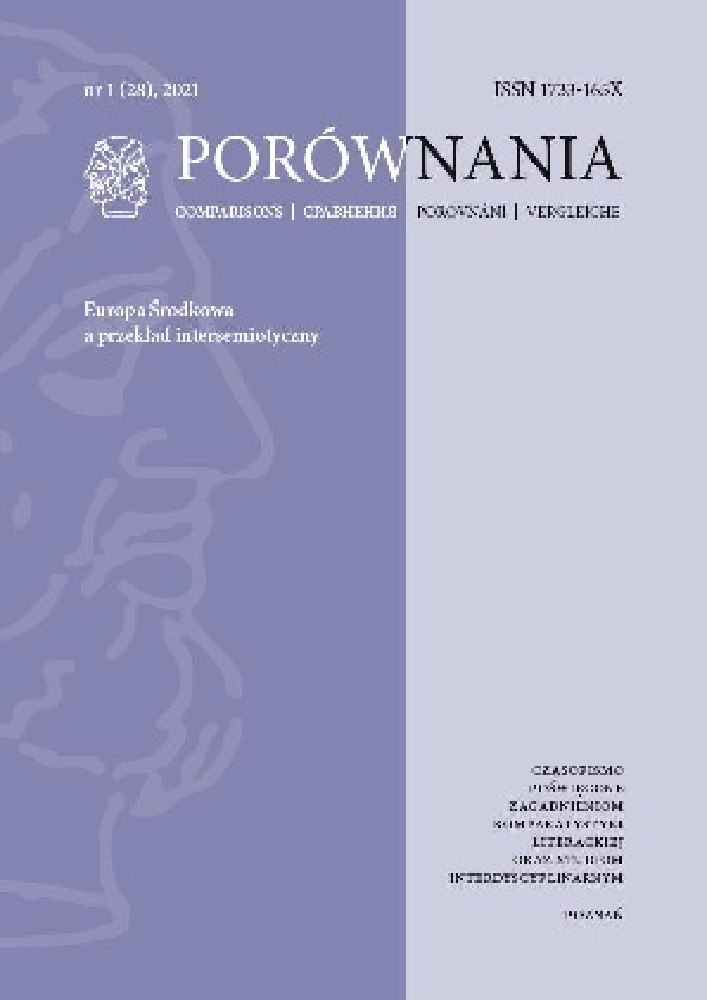Abstrakt
Społeczno-polityczne otoczenie Irlandii Północnej na przestrzeni ostatnich dekad „wymusiło” na swoich obywatelach opowiedzenie się po jednej ze stron antagonizującego
konfliktu tożsamościowego. W roku 1998 zostało podpisane Porozumienie Wielkopiątkowe, którego celem było zakończenie konfliktu pomiędzy stroną katolicko-nacjonalistyczną a stroną protestancko-unionistyczną. Ta ugoda służyła stworzeniu trwałych, kolektywnych ram dla zabezpieczenia wzajemnej koegzystencji, co ważniejsze jednak, stanowiła wsparcie dla idei regionalnej tożsamości (jej przemodelowanego formatu), która miała być punktem odniesienia dla obu społeczności. O ile wyżej wzmiankowany społeczny konsensus został zinstytucjonalizowany, nawet jeśli tylko na podstawowym poziomie, o tyle pożegnanie się z politycznymi/religijnymi (wręcz sekciarskimi) afiliacjami okazało się dużo trudniejsze. Glenn Patterson sytuuje się pośród tych lokalnych pisarzy, którzy podejmują walkę z dziedzictwem uciążliwych formacji tożsamościowych. Stąd też głównym celem tego artykułu jest przedstawienie przeszkód, z jakimi tacy autorzy jak Patterson muszą się mierzyć, gdy celem staje się wsparcie dla nowego północno-irlandzkiego rysu tożsamościowego. Czyniąc to, Patterson uznaje dekonstrukcję/odrzucenie głęboko zakorzenionych podziałów z epoki „the Troubles” (tłumaczone na język polski na dwa sposoby: ‘kłopoty’ oraz ‘niepokoje’) za warunek konieczny wszelkich pozytywnych/konstruktywnych zmian. Mając na uwadze tematyczne ramy tego wydania „Porównań”, którego celem jest współczesna refleksja nad kwestią Ziem Odzyskanych, pozwalam sobie przedstawić Pattersona nie tylko jako autora, ale także obywatela, którego artystyczny wysiłek jest ukierunkowany na odzyskanie terytorium w celu (prze)budowy tożsamości Irlandii Północnej i zastąpienia ugruntowanych (katolicko-protestanckich/brytyjsko-irlandzkich) dychotomii. W oparciu o jego dwa zbiory esejów/relacji o charakterze niefikcyjnym, zatytułowanych Lapsed Protestant
(2006) i Here’s Me Here (2016), w poniższej analizie uwaga zostaje skoncentrowana na nadziejach autora i przeszkodach, które uwypukla w swych tekstach w kontekście
tematyki promującej bardziej neutralną/niespolityzowaną północno-irlandzką tożsamość. Być może opis dynamiki tych dylematów tożsamościowych pozwoli nam
spojrzeć z innej, raczej niespodziewanej perspektywy również na kontekst polski.
Bibliografia
Bartnik, Ryszard. Inscribed into the Past. A Comparative Study of South African and Northern Irish Literary Narratives after the Political Watersheds of the 1990s. Poznań: Wydawnictwo Naukowe UAM, 2017.
Brewer, John. “The Sociology of the Northern Irish Peace Process.” The Legacy of the Good Friday Agreement. Northern Irish Politics, Culture and Art after 1998. Eds. Charles I. Armstrong, David Herbert and Jan E. Mustad. Basingstoke: Palgrave Macmillan, 2019. 271–289.
Burns, Anna. Milkman. London: Faber and Faber, 2018.
Bush, Kenneth. “The Politics of Post-conflict Space: The Mysterious Case of Missing Graffiti in ‘Post-troubles’ Northern Ireland.” Contemporary Politics 19.2 (2013): 167–189.
Fenton, Owen. “Narratively Framing Emergent Identities in Post-agreement Societies of the Northern Irish Identity with the Provincial Media.” National Identities 20.3 (2018): 235–257.
Grzechnik, Marta. “‘Recovering’ Territories: The Use of History in the Integration of the New Polish Western Borderland after World War II.” Europe-Asia Studies 69.4 (2017): 668–692.
Hancock, Landon E. “Narratives of Commemoration: Identity, Memory, and Conflict in Northern Ireland 1916–2016.” Peace and Change. A Journal of Peace Research 44.2 (2019): 244–265.
Heidemann, Birte. New Direction in Irish and Irish American Literature. Basingstoke: Palgrave Macmillan, 2016.
Hogg, Clare Dwyer. “Glenn Patterson Interviewed by C. D. Hogg,” 26 March 2004, https://tinyurl.com/at4739na. Accessed 23 November 2008.
Hopkins, Stephen. The Politics of Memoir and the Northern Irish Conflict. Liverpool: Liverpool UP, 2013.
Ichijo, Atskuko et al. “Debate on Understanding National Identity by David Mc-Crone and Frank Bechhofer.” Nations and Nationalism 23.3 (2017): 441–462.
Kearney, Richard. “Renarrating Irish Politics in a European Context.” European Studies 28 (2010): 41–57.
Kennedy-Andrews, Elmer. (De-)constructing the North. Fiction and the Northern Irish Troubles since 1969. Dublin: Four Courts Press, 2003.
Łojek, Aleksandra. Belfast. 99 Ścian Pokoju (Belfast. The 99 Walls of Peace). Wołowiec: Wydawnictwo Czarne, 2015.
McKittrick, David and David McVea. Making Sense of the Troubles. London: Penguin Books, 2001.
McNicholl, Kevin et al. “How the ‘Northern Irish’ National Identity is Understood and Used by Young People and Politicians.” Political Psychology 40.3 (2019): 487–506.
Muldoon, Orla T. et al. “Religious and National Identity after the Belfast Good Friday Agreement.” Political Psychology 28.1 (2007): 89–103.
Parker, Michael. Northern Irish Literature, 1975–2006. London: Palgrave Macmillan, 2007.
Patterson, Glenn. “Interviewed by Aliaga.” Interviews with Writers and Academics. Eds. Jacqueline Hurtley et al. Amsterdam, Atlanta: Rodopi, 1998. 93–107.
---. Lapsed Protestant. Dublin: New Island, 2006.
---. Here’s Me Here. Dublin: New Island, 2016.
---. Backstop Land. London: Head of Zeus, 2019.
Schacter, Rafael. “A Review of ‘The Great Reimagining: Public Art, Urban Space and the Symbolic Landscapes a ‘New’ Northern Ireland’ by Bree T. Hocking.” Journal of the Royal Anthropological Institute 23 (2017): 193–194.
Shirlow, Peter and Brendan Murtagh. Belfast: Segregation, Violence and the City. London: Pluto Press, 2006.
The Northern Ireland Peace Agreement. 1998, https://tinyurl.com/weuep45x. Accessed 11 December 2020.
Todd, Jennifer. “Partitioned Identities? Everyday National Distinctions in Northern Ireland and the Irish State.” Nations and Nationalism 21.1 (2015): 21–42.
Licencja
Utwory opublikowane w czasopiśmie „Porównania”, na platformie Pressto należącej do Uniwersytetu im. Adama Mickiewicza w Poznaniu są udostępniane na licencji Creative Commons Uznanie autorstwa - Bez utworów zależnych 4.0 Międzynarodowe (CC BY-ND 4.0)
Tym samym wszyscy zainteresowani są uprawnieni do korzystania z utworów opublikowanych pod następującymi warunkami:
-
uznania autorstwa — czyli obowiązek podania wraz z rozpowszechnianym utworem informacji o autorstwie, tytule, źródle (odnośniki do oryginalnego utworu, doi) oraz samej licencji
-
bez utworów zależnych — remiksując, przetwarzając lub tworząc na podstawie utworu, nie wolno rozpowszechniać zmodyfikowanych treści.
-
brak dodatkowych ograniczeń — nie można korzystać ze środków prawnych lub technologicznych, które ograniczają innych w korzystaniu z utworu na warunkach określonych w licencji.
Uniwersytet im. Adama Mickiewicza w Poznaniu zachowuje prawo do czasopisma jako całości (układ, forma graficzna, tytuł, projekt okładki, logo itp.).
Autor zachowuje prawa majątkowe, ale udziela zgody Uniwersytetowi im. Adama Mickiewicza w Poznaniu na wykorzystanie dzieła. Autorzy tekstów zakwalifikowanych do publikacji proszeni są o wypełnienie podpisanie i przesłanie umowa (PL) agreement (EN)
Agreement for granting a royalty-free license to works with a commitment to grant a CC sub-license





